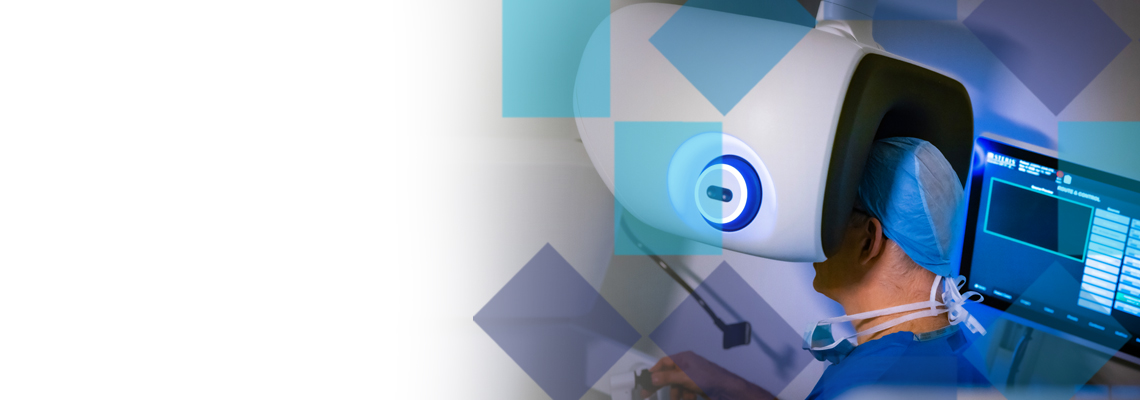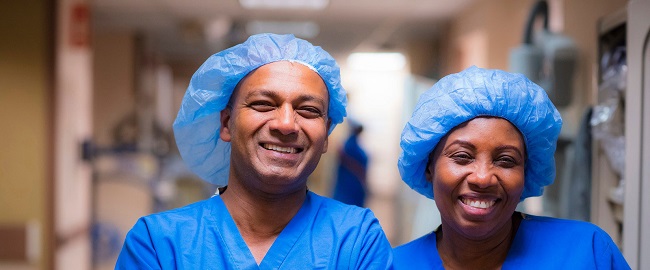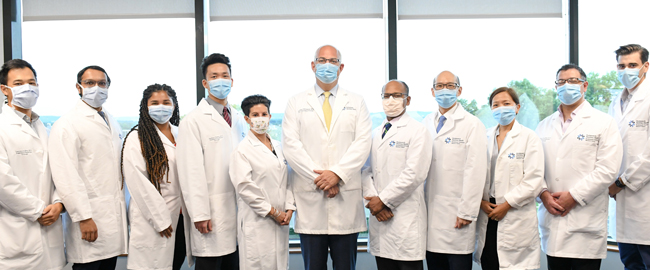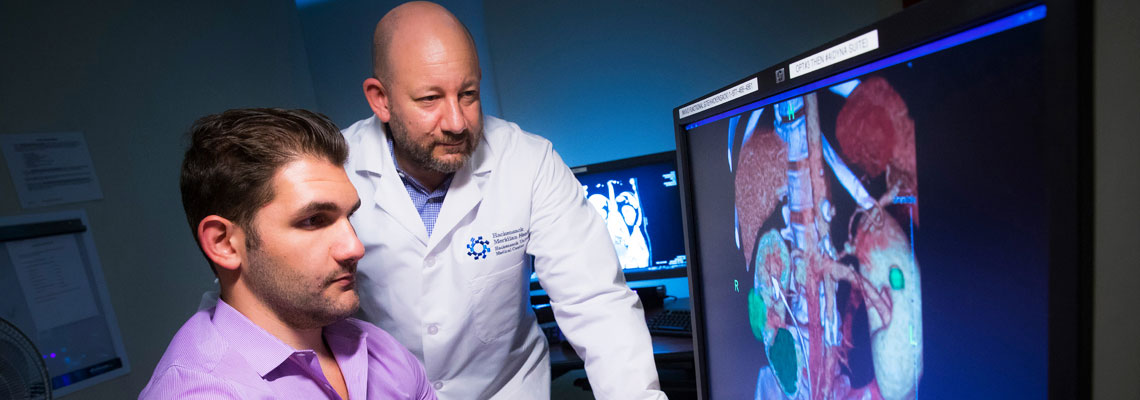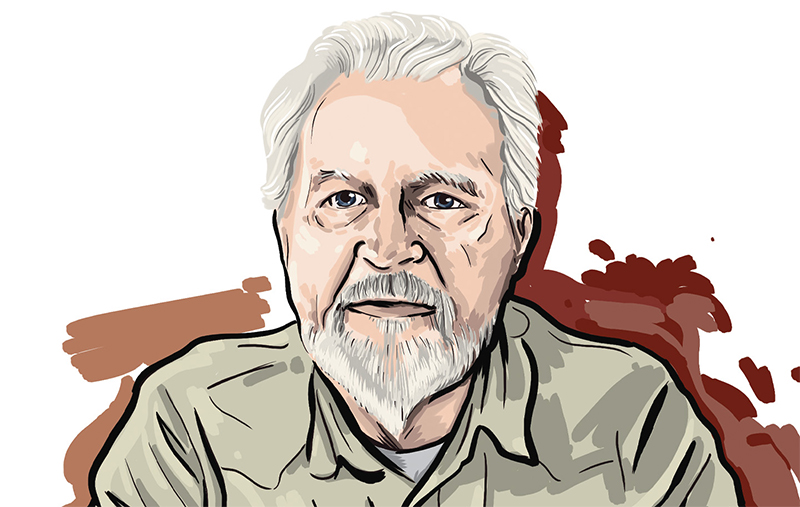Top Urology Care in New Jersey
Hackensack University Medical Center has been ranked the best Urology Program in New Jersey for 12 years in a row by U.S. News & World Report and ranked in the Top 20 nationally. The medical center is also a Top 5 Urology program in the NY-NJ Metro Area for 2025-2026 U.S. News & World Report.
We specialize in a range of urologic disciplines including urologic oncology, infertility, stone disease, sexual dysfunction, female urology and pediatric urology.
Our surgeons pioneered the development of some of this specialty’s most successful procedures, including robotic partial nephrectomy, robotic prostatectomy and complex robotic urinary reconstruction.
Watch the video below to learn more about our four pillars of urological excellence - clinical outcomes, research, education, and philanthropy.
Expert Urologists In New Jersey
Find a urologist to diagnose and treat your urological condition, urology care location in New Jersey or view our entire list of urology services.Urology Advancements
Urology physicians at Hackensack Meridian Health are on the cutting edge of research and innovation. Read about what they've been up to with some of our recent articles below.
- HUMC Urology Team Embraces Latest Software and 3D Printing Innovations
- HUMC First in World to Use AI-Powered HYDROS™ Robotic System to Perform Aquablation® Therapy
- Center for Sexual Health and Fertility Embraces Robot-Assisted Microsurgery
- HUMC Offering Intravesical Chemotherapy for Persistent Noninvasive Bladder Cancer
- HUMC Performs 1,000th Single-Port Robotic Procedure
Robotic and Minimally Invasive Urology Surgery
Hackensack Meridian Health is a leader in providing robotic and minimally invasive surgery for urology. Across the network, we have eight dedicated robotic surgical systems, including the Da Vinci SP® single-port robot, which provides surgeons with a magnified view of the surgical area and a greater range of motion.
Each year, we perform more than 1,000 advanced urologic robotic surgery procedures, making us one of the most experienced hospital systems in the country. All bladder cancer surgeries can be performed robotically, and nearly all kidney cancer surgeries can be performed using minimally invasive techniques. Learn more about robotic urological surgery.
Leaders in Single Port Robotic Surgery
Hackensack University Medical Center was among the first hospitals in the world — and the first in New Jersey — to use the fourth-generation da Vinci SP® single-port robotic surgery system for urologic surgeries. The SP platform provides for a new approach to single-site laparoscopic or robotic techniques and offers a minimally invasive approach for major robotic urological operations. The da Vinci SP surgical system provides surgeons with a magnified view of the surgical area as well as a greater range of motion thanks to the advanced robotics involved. The surgeon’s hand motions are translated in real time and guided through a console, making it possible for operations to occur through a single 1-inch wide incision. Learn more about what makes us leaders in urology.
Frequently Asked Questions
The urology department at Hackensack Meridian Health provides comprehensive care for a wide range of conditions affecting the urinary tract and male reproductive system.
This includes cancers like prostate, bladder, and kidney, benign prostatic hyperplasia (BPH or enlarged prostate), kidney stones, erectile dysfunction (ED), UPJ obstructions, urinary incontinence, and pelvic floor disorders.
Some of the most common reasons why someone would need to see a urologist include:
- Problems with Urination
- Blood in the urine (hematuria)
- Frequent or urgent need to urinate
- Pain or burning during urination
- Difficulty urinating
- Urinary incontinence (leaking urine)
- Male-Specific Issues
- Prostate Gland Issues: An elevated PSA (Prostate-Specific Antigen) blood test, concerns about prostate cancer, or symptoms of an enlarged prostate (BPH), such as a weak urine stream.
- Erectile Dysfunction (ED): Difficulty achieving or maintaining an erection.
- Male Infertility: A urologist can investigate the potential causes of a couple's difficulty conceiving.
- Lumps or Pain in the Testicles: This requires immediate evaluation to rule out testicular cancer or other issues like varicoceles.
- Vasectomy: A surgical procedure for permanent male birth control.
- Low Testosterone (Low T): Diagnosing and managing symptoms like fatigue, low libido, and mood changes.
- Female-Specific Issues
- Pelvic Organ Prolapse: When organs like the bladder or uterus drop or press into the vagina, causing a feeling of pressure or a bulge.
- Recurrent UTIs: Frequent, recurring bladder infections.
- Bladder Pain Syndrome / Interstitial Cystitis (IC): Chronic pain or pressure in the bladder area.
- Cancers of the Urinary Tract
- Prostate Cancer
- Bladder Cancer
- Kidney Cancer
- Testicular Cancer
- Penile Cancer
- Kidney Stones
Hackensack Meridian Health uses Advanced Technology and Surgical Approaches to treat urological conditions. Some of the main urology treatments include:
Urologic Cancers (Prostate, Bladder, Kidney)
- Bladder Cancer:
- TURBT (Transurethral Resection of a Bladder Tumor): A minimally invasive procedure to diagnose and remove early-stage tumors.
- Intravesical Therapy: Placing medications like BCG (Bacillus Calmette-Guerin) or chemotherapy directly into the bladder to treat non-muscle invasive cancer.
- Robotic-Assisted Radical Cystectomy: Surgical removal of the bladder for muscle-invasive cancer.
- Advanced Bladder Reconstruction: Creating a new way for the body to store and pass urine after bladder removal, including a neobladder (a new bladder made from intestinal tissue).
- Prostate Cancer:
- Robotic-Assisted Radical Prostatectomy: The surgical removal of the prostate gland.
- Active Surveillance: For low-risk cancers, a monitoring strategy to avoid or delay treatment.
- Kidney Cancer:
- Robotic-Assisted Partial Nephrectomy: Removing only the cancerous part of the kidney to preserve organ function.
- Robotic-Assisted Radical Nephrectomy: Removing the entire kidney when necessary.
Benign Prostatic Hyperplasia (BPH) / Enlarged Prostate
- Medical Management: Prescription medications to shrink the prostate or relax the bladder muscles.
- Minimally Invasive Surgical Therapies:
- HoLEP (Holmium Laser Enucleation of the Prostate): An advanced laser procedure to remove prostate tissue that is blocking urine flow.
- TURP (Transurethral Resection of the Prostate): A long-established procedure to surgically remove excess prostate tissue.
- Oral Medications: Prescribing FDA-approved pills (e.g., Viagra, Cialis).
- Penile Injections (Intracavernosal Injections): Self-administered injections that produce a reliable erection.
- Vacuum Erection Devices: A non-invasive external pump.
- Penile Implants: A permanent surgical solution where a device is implanted to allow for on-demand erections, for men who have not had success with other treatments.
Female Urology and Pelvic Health
- Bladder Pain Syndrome / Interstitial Cystitis (BPS/IC):
- Pelvic Floor Physical Therapy: Specialized therapy to relax pelvic muscles.
- Bladder Instillations: Placing a soothing medicinal "cocktail" directly into the bladder.
- Nerve Stimulation (InterStim™): An implanted device that modulates nerve signals to the bladder.
- Botox® Injections: Injections into the bladder muscle to reduce urgency and pain.
- Urinary Incontinence & Pelvic Organ Prolapse:
- Offering a range of treatments from physical therapy to advanced, minimally invasive surgical repairs, often using robotic assistance for procedures like sacrocolpopexy (prolapse repair).
- Medical Management & Prevention: Dietary counseling and medication to help pass small stones and prevent new ones from forming.
- Minimally Invasive Procedures: Advanced techniques to break up or surgically remove stones that are too large to pass on their own (e.g., ureteroscopy with laser lithotripsy, shock wave lithotripsy).




